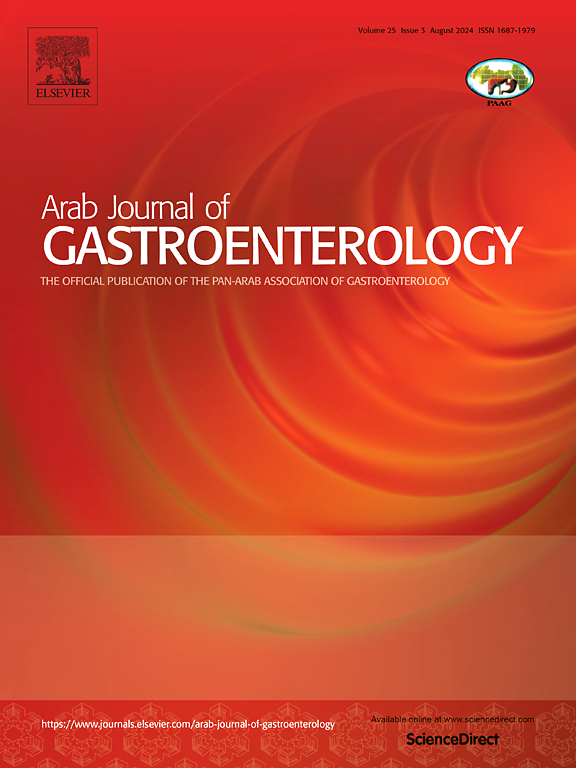乳糜泻患者的生活质量和抑郁状态:一项病例对照研究
IF 1.1
4区 医学
Q4 GASTROENTEROLOGY & HEPATOLOGY
引用次数: 0
摘要
背景与研究目的:本研究的目的是评估乳糜泻患者的生活质量、抑郁易感性及其可能的相关因素。患者和方法:该研究计划作为病例对照研究,于2023年5月至2023年8月在伊斯坦布尔Umraniye培训和研究医院进行。该研究包括81名年龄在18-65岁之间的乳糜泻(CD)患者,他们在胃肠病学门诊接受随访,79名健康对照者在家庭医学门诊接受随访。参与者接受了乳糜泻问卷(CDQ)、世界卫生组织生活质量量表-短表(WHOQOL-BREF)和贝克抑郁量表(BDI)。使用SPSS 24 (Statistical Package for Social Sciences)进行统计分析。结果:共纳入160例受试者,其中女性118例(73.8%),男性42例(26.3%)。年龄和性别分布相似。与健康对照组相比,乳糜泻组的WHOQOL-BREF“整体健康”亚量表得分明显较低(p = 0.004, Cohen’s d = 0.46)。然而,其他WHOQOL-BREF量表和抑郁水平无显著差异(p < 0.05)。在乳糜泻组中,高等教育水平(本科和研究生)与更好的生活质量评分相关(η2 = 0.11, p = 0.015),而低教育水平与更高的抑郁评分相关(p = 0.019)。CDQ评分与BDI评分呈显著负相关(r = -0.529, p = 0.001),表明抑郁水平越高,生活质量越低。当控制混杂变量时,性别和乳糜泻被证明与总体健康亚量表得分独立相关。结论:在我们的研究中,CD患者的生活质量量表CDQ和WHOQOL-BREF评分均领先于曲线。研究还发现,乳糜泻患者的WHOQOL-BREF量表“整体健康”亚量表得分较低,而其他子参数和抑郁症状与健康个体相当,较低的“整体健康”亚量表得分突出了有针对性干预的必要性。本文章由计算机程序翻译,如有差异,请以英文原文为准。
Quality of life and depressive state in patients with celiac disease: A case-control study
Background and study aims
The objective of this study was to evaluate the quality of life (QoL) of celiac patients, their predisposition to depression, and possible related factors.
Patients and methods
The study was planned as a case-control study and conducted between May 2023 and August 2023 at Umraniye Training and Research Hospital, Istanbul. The study included 81 patients with celiac disease (CD) aged 18–65 years who were followed up at the Gastroenterology outpatient clinic and 79 healthy controls who were admitted to the Family Medicine Outpatient Clinic. Participants were administered the Celiac Disease Questionnaire (CDQ), the World Health Organization Quality of Life Scale-Short Form (WHOQOL-BREF), and the Beck Depression Inventory (BDI). Statistical analysis was performed using SPSS 24 (Statistical Package for the Social Sciences).
Results
The study was conducted with 160 participants, of whom 73.8 % (n = 118) were female and 26.3 % (n = 42) were male. Age and gender distributions were similar. The celiac group had significantly lower scores of the WHOQOL-BREF “Overall Health” subscale compared to healthy controls (p = 0.004, Cohen’s d = 0.46). However, no significant differences were observed in other WHOQOL-BREF subscales or depression levels (p > 0.05). In the celiac group, higher education levels (undergraduate and postgraduate) were associated with better QoL scores (η2 = 0.11, p = 0.015), while lower education was linked to higher depression scores (p = 0.019). A strong negative correlation was found between CDQ scores and BDI scores (r = -0.529, p = 0.001), indicating that higher depression levels were associated with lower QoL.When controlled for confounding variables, gender and CD turned out to be independently related to overall health subscale scores.
Conclusion
In patients with CD, both the QoL scale CDQ and the WHOQOL-BREF scores were found to be ahead of the curve in our study. It was also observed that the WHOQOL-BREF scale “overall health” subscale score was lower in celiac patients, while other sub-parameters and depressive symptoms were comparable to healthy individuals The lower “Overall Health” subscale scores highlight the need for targeted interventions.
求助全文
通过发布文献求助,成功后即可免费获取论文全文。
去求助
来源期刊

Arab Journal of Gastroenterology
Medicine-Gastroenterology
CiteScore
2.70
自引率
0.00%
发文量
52
期刊介绍:
Arab Journal of Gastroenterology (AJG) publishes different studies related to the digestive system. It aims to be the foremost scientific peer reviewed journal encompassing diverse studies related to the digestive system and its disorders, and serving the Pan-Arab and wider community working on gastrointestinal disorders.
 求助内容:
求助内容: 应助结果提醒方式:
应助结果提醒方式:


